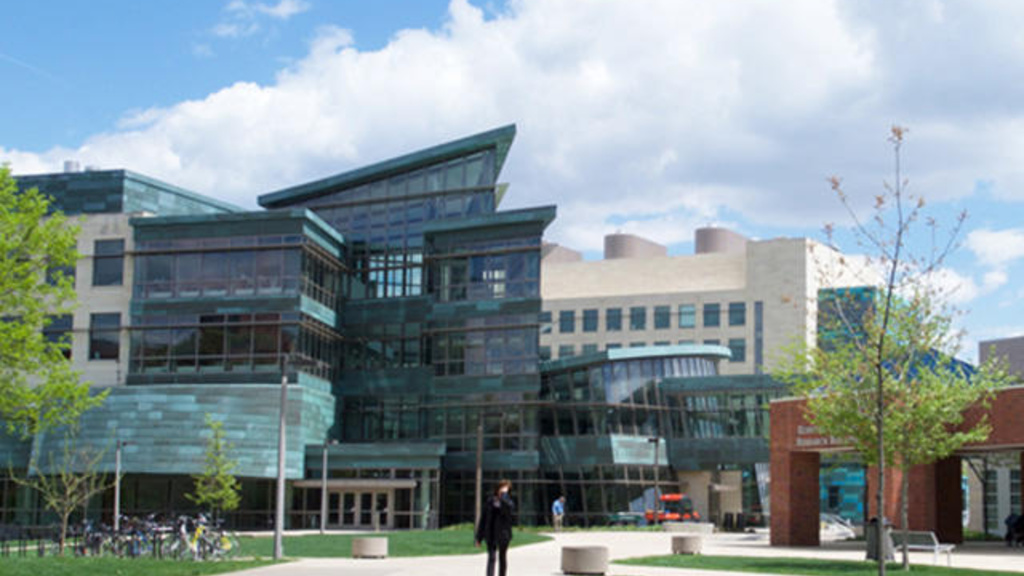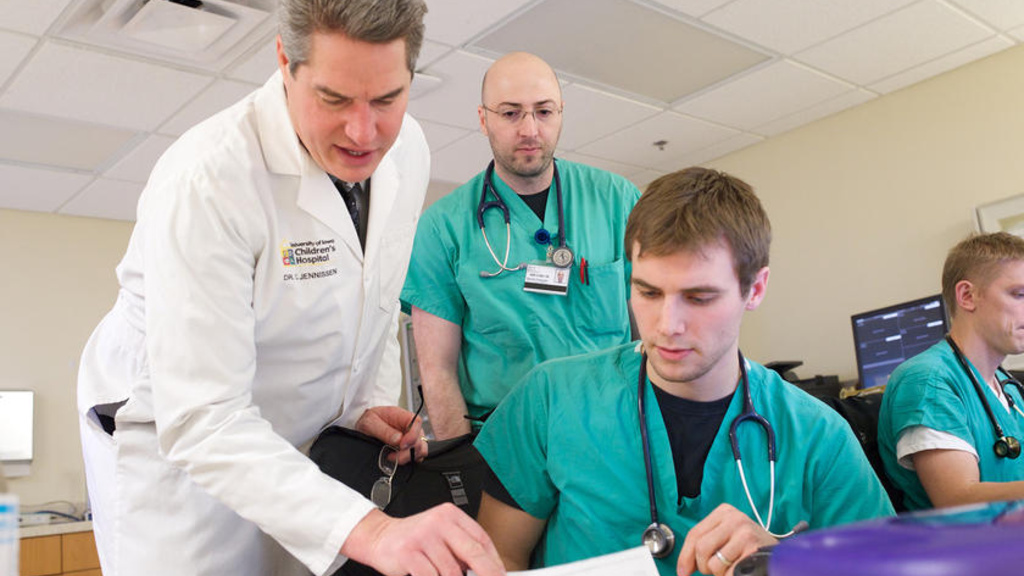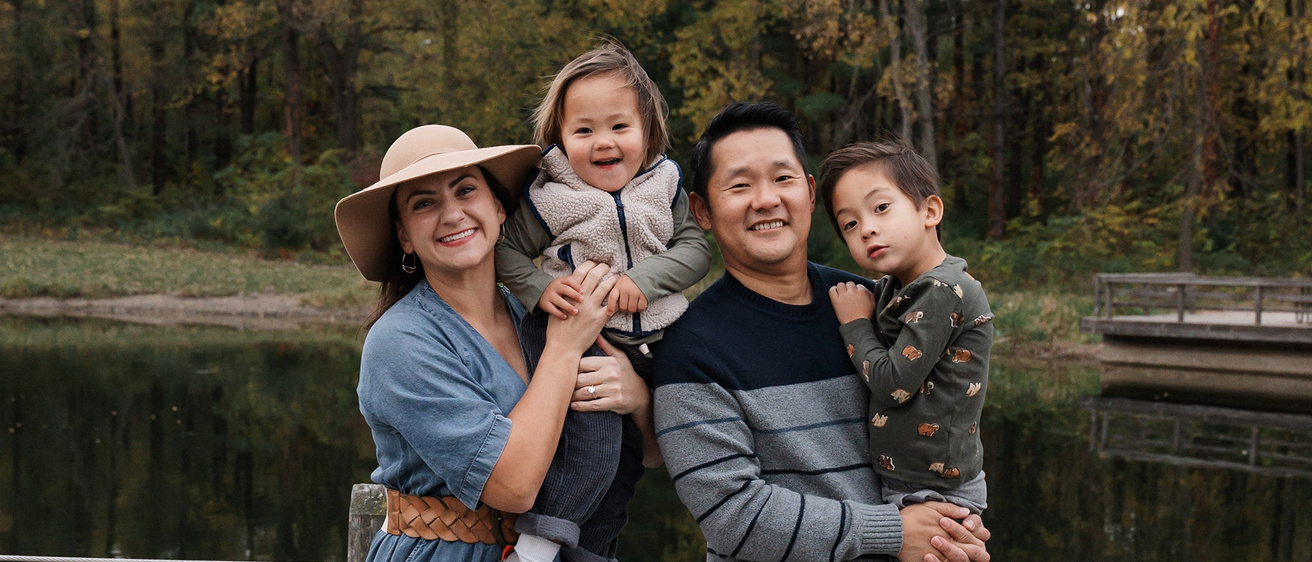Many physicians feel the calling to practice medicine from early childhood. For those with no physicians in their families, the decision is often less obvious. Iowa alum Allie Kim shares the story of hard work and self-discovery that led to her dream job.
Story: Celine Robins
Photography: courtesy of Allie Kim
Published: Feb. 29, 2024
The top photo...
While Allie Kim was in med school at the University of Iowa, one classmate caught her eye: Sung Kim, whom she married in the summer after her second year. The pair started their family during residency training and now have two sons, ages 2 and 5.
Allie Kim, MD, spent a lot of time as a kid in West Des Moines, Iowa, playing in the timbered creek just past her backyard. Nature walks, catching and observing animals, and “experiments” such as putting a net in the creek to see how much litter she could catch fostered a love for biology that would become the basis for her future career.
“I just loved being outside in the nature of our backyard,” she says. “It was one of my favorite things to do. For a while, I was really interested in the animal side of medicine, but eventually I realized that I wanted to have more social interaction with my patients.”
Like many future physicians, though, that decision only seems obvious in hindsight. Kim spent years trying out different paths to figure out what would be right for her—and experienced personal growth along the way.
“It was a long journey. I was three years out of undergrad before I finally chose to go to medical school,” she says. “But I had so many fun experiences.”
Kim played Division I soccer as a left fullback for the University of Tulsa and played in Botswana during a semester abroad. She was president of the biology club and took an interest in ornithology. As an intern at the Tulsa Zoo, she busted someone for attempting to abscond with a paper bag of poison dart frogs. She worked as a barista and pastry chef in Manhattan. In short, her path to medicine was anything but traditional.
When she began to get curious about health care careers, Kim was years behind the typical training timeline of a medical professional. She took an emergency medical technician training course in New York City to test the waters, gaining her first exposure to emergency medical care. She then made her way to Washington, D.C., and found a job listing on Craigslist for a medical assistant in a dermatologist’s office which, over time, developed into numerous roles to keep the office running smoothly.
“That was my first time getting to know doctors,” Kim says. “When you go to a doctor growing up, it’s just a quick visit. I had never ‘hung out’ with doctors. It was this weird revelation—they are normal people. I always doubted myself and thought, ‘Who am I to go to medical school?’ But then I started to think, ‘I could be a doctor.’”

Medicine at Iowa
The Roy J. and Lucille A. Carver College of Medicine is a highly ranked medical school where students learn to become accomplished clinicians and top-flight researchers and educators. Students come to Iowa to study medicine in a program that uses case-based learning as the basis of their education.
‘This new world for me to explore’
Kim is the first physician in her family. Her parents were excited and supportive of her choice, but the medical school application process can be difficult to understand if you’ve never known someone who’s been through it before.
“It was this new world for me to explore, and there’s so much to learn,” Kim says. “What it’s really like; the requirements to get in; how to get your résumé just right. All those things that you need to know to present yourself in this package that people would want to have as a med student.”
With focus and perseverance, she prepared for and took the MCAT on her own. She had to take several additional classes to meet the prerequisites for medical school admissions. She also learned about how to best present herself in admissions interviews. Her hard work eventually paid off in the form of four acceptances to medical schools. Once she learned that the University of Iowa Carver College of Medicine was one of them, she knew immediately that was where she wanted to be.
“Eventually I wanted to make a family and be back in Iowa,” she says. “I was so happy after I found out that I got in.”
“Emergency medicine was probably at the bottom of my list as a first-year med student. But it’s where I ended up, and I love it. I would encourage people to keep an open mind, take advantage of all opportunities, and never close the door on any specialty until you actually experience it.”
Kim began medical school a few years later in life than most of her classmates, but that didn’t hamper her excitement. She was thrilled to meet her medical school classmates and find that they had so much in common.
“They like anatomy. They like talking about gross medical stuff. They’re nerdy people; they have silly hobbies,” she says. “It was cool to be around such smart and talented people.”
Because of her experience as an athlete—including recovering from sports injuries that required multiple knee surgeries—she entered medical school interested in becoming an orthopedic surgeon.
“I had been around the orthopedic side of things a lot as a patient, so I was thinking that I wanted to be an orthopedic surgeon, help young athletes get through their injuries and put them back on the field,” she says.
A rural emergency medicine rotation in Burlington, Iowa, sparked an interest in the specialty that made her want to learn more.
“You get to do procedures. You’re on your feet all the time. The people that work there are hilarious and fun to talk to. And the stuff you see in the ER, you can’t make that up,” she says. “Every day is so different. I thought it was so cool.”
The same part of Kim that thrived on the soccer field, making quick decisions and working as a well-oiled machine with her teammates, also thrived in the emergency department. Now she can hardly imagine herself in any other specialty.
“Emergency medicine was probably at the bottom of my list as a first-year med student,” she says. “But it’s where I ended up, and I love it. I would encourage people to keep an open mind, take advantage of all opportunities, and never close the door on any specialty until you actually experience it.”
Between the long nights of studying and fascinating clinical experiences of medical school, one classmate caught her eye: Sung Kim (15MD, 20F), whom she married in the summer after her second year. The pair started their family during residency training and now have two sons, ages 2 and 5.
The next chapter: physician wellness
Kim finds day-to-day work in the emergency room invigorating and rewarding. She also recognizes that it takes personal resilience to deal with the tough stuff, like delivering bad news to a patient or family.
“I have learned you have to use very plain language. ‘You have a brain tumor,’ not ‘You have a glioblastoma.’ Just go through everything with them,” she says. “It gets a little bit easier with time. Some cases are more emotional than others, and I’ve cried with people before. But you just separate yourself and think, ‘Right now, my job is to give them this information that they need.’ I want to make sure that all their questions are answered, and they understand what’s going on.”
While her kids are young, Kim has chosen to work reduced hours in the emergency department at UnityPoint Health in Des Moines. This summer, she will transition toward a more administrative role as one of the core faculty members of the hospital’s new emergency medicine residency program. She will lead the program’s physician wellness curriculum, helping to provide resources, social opportunities, and mentorship to the six trainees in the program’s very first class.

Emergency medicine
The Department of Emergency Medicine has a clear commitment to education through training programs for medical students, residents, fellows, physician assistant providers and other health sciences students. The medical clerkship has routinely been one of the highest rated within the Carver College of Medicine and the Emergency Medicine Residency Program is fully accredited to train physicians in a 36-month program and physician assistant providers in a 18-month program.
“My take on workplace happiness is that it’s a lot about your personal happiness,” she says.
Kim has taught medical students on rotation in Des Moines before and loved doing it, so she’s excited for the fresh influx of enthusiasm and passion that having resident trainees of their very own will bring to the department starting this summer.
“I really care about them as people,” she says. “I care about their success in their field, too—I don’t want them to be making wrong medical decisions—but I don’t want them to be treated poorly, either. My mode of operation is a lot of kindness. If they make a mistake, I’ll tell them, but it’s also important to be patient with them. We’ve all been there.”
